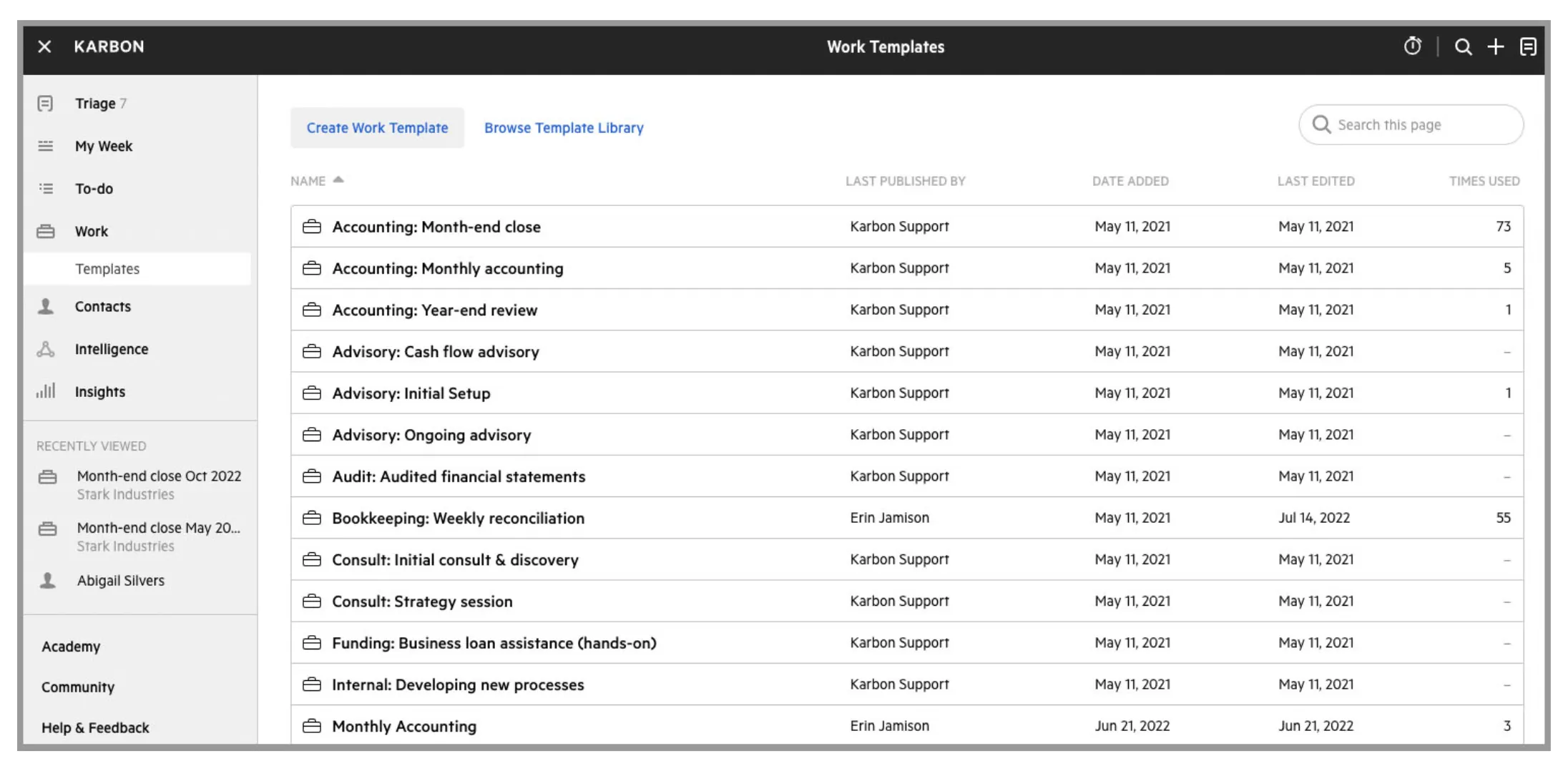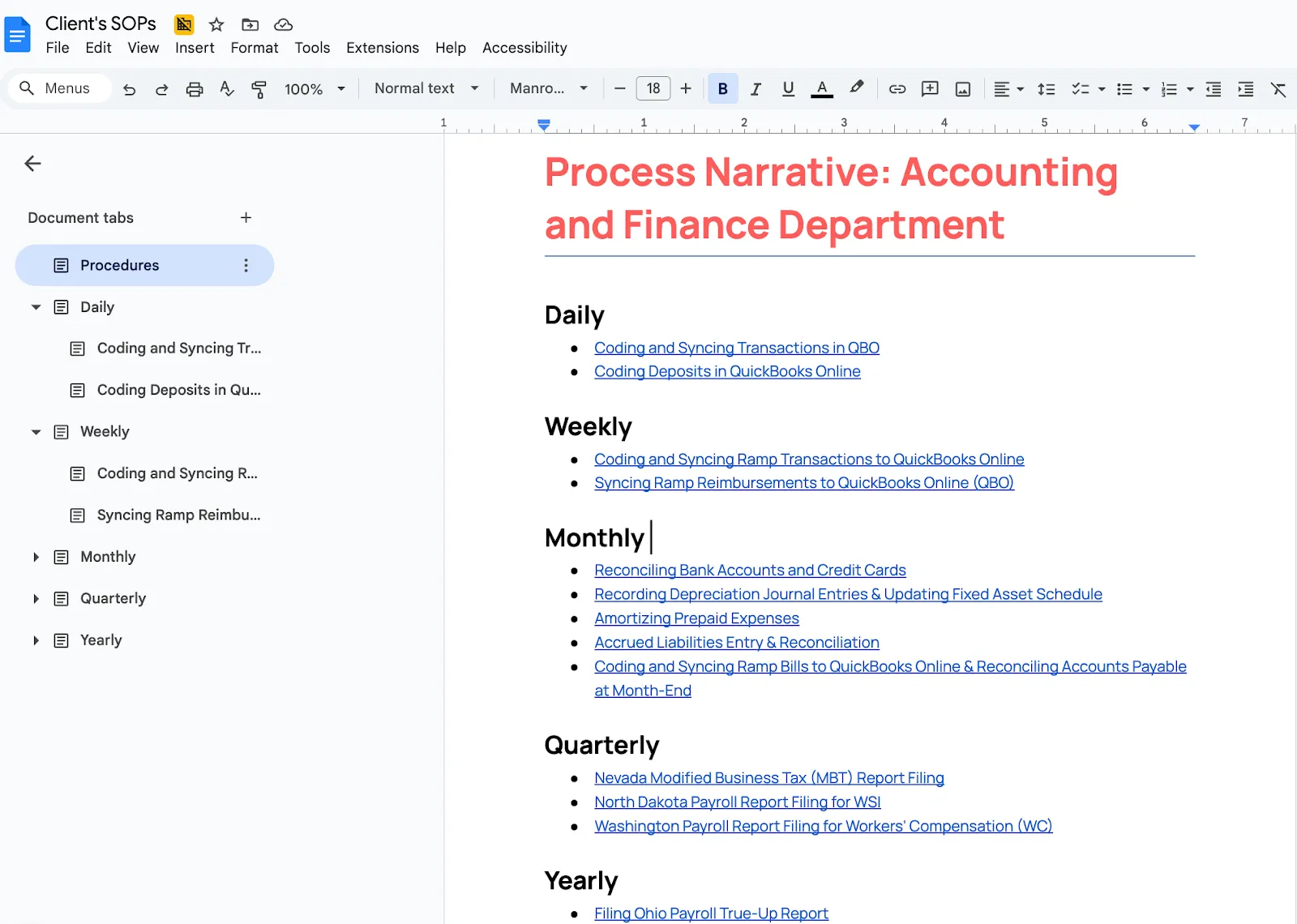SOPs are essential for scaling fractional CFO and accounting services. At Kordis, we use SOPs to streamline operations, improve client delivery, and empower our growing team.

When we first thought of developing SOPs, it didn’t make sense to us. We thought “we’re not about to standardize our services. The added value of our service, as a fractional CFO and accounting firm, is having a tailored service to each client. If we standardize, we lose value”.
Then, the firm started to grow and it wasn’t just the three of us anymore. The team started growing, and the work itself demanded from us to have easier processes for onboarding not only the clients but also our new hires. That’s when we realized it was time to take a look back at building SOPs.
SOP stands for Standard Operating Procedures. It’s just a fancy concept for detailed instructions to show how to do a task step by step.
If you’re an accounting or fractional CFO firm like us, your SOPs might look something like these:
Doing monthly bank reconciliations:
1. Download statements from Mercury bank
2. Open QuickBooks
3. Match transactions
4. Save PDF reports in the client folder.
or
Onboarding a new client:
1. Send welcome email
2. Set up shared Drive
3. Schedule an intro call
4. Collect access to tools
These are examples of how SOPs work hand in hand with accounting workflows and help fractional CFOs streamline results.
In fractional CFO and accounting services, details matter. Missing a deadline, misclassifying a transaction, or forgetting a client-specific detail can create problems that end up damaging not only the accuracy of calculations, but also clients' trust and relationships. SOPs help us eliminate those risks by creating a repeatable, quality-driven system for every client engagement.
For us at Kordis, no two clients are the same, and this precise reasoning was what pushed us back from creating SOPs before.
Now, we understand that the “S” for Standard doesn’t mean “same processes for every client”, but “same within our team”.
Instead of generic templates, we create custom SOPs for each client’s needs, whether they’re a bookkeeping, accounting or fractional CFO client. We adapt based on their software, industry, and reporting cadence. We might have a tech startup needing weekly burn rate updates or a property manager that requires monthly rent roll reconciliations. In any case our SOPs ensure:
You can have your SOPs in a variety of places depending on how your team works.
What matters the most is for your SOPs to be centralized and accessible, so your entire team can reference, update, and execute them with precision.
Karbon, Keeper, Jetpack Workflow, and Financial Cents are specifically built for accounting and fractional CFO workflows. But you can also use the project management tools that you already have, like Notion, ClickUp, Asana, Monday.com, Trello and Loom. You can check out all the software tools we use in the article 11 SaaS tools every fractional CFO needs.

We have a Shared Drive with a Folder for each different client and, in there, we keep a spreadsheet with procedures titles and deadlines. In a Word Doc we keep all the written procedures separated by tabs. We have the titles of each procedure in the Spreadsheet linked directly to the tab of that document, so we don’t have to browse through a 30 page document.

Again, this is what works for us. Doesn’t have to work for you.
From day one! One of the first things we do when onboarding a new client is to create a customized SOP spreadsheet for them.
This includes:
You can start documenting from the first meeting you have with the client, leveraging AI tools like Fathom or Granola. Record all your meetings, both with the client and with the internal team talking about the client. Then run the transcripts on ChatGPT and have it build the SOPs for you.
This process helps us onboard clients and build our SOPs faster, with less questioning and more confidence on both ends. Overall, it enables us to scale our fractional CFO services, without compromising accuracy in our accounting processes.
Although building SOPs might sound like a one time thing, we’re constantly changing, updating and upgrading them. Software improves, or clients need to shift, so we optimize our workflows. Every team member at Kordis is asked to contribute improvements, and we review SOPs regularly to ensure we’re operating at peak performance. As a fractional CFO firm, staying agile in our SOPs means we can continue to deliver reliable accounting services to our clients.

In our industry there are always fires to put out. It'd be a lie to say SOPs help eliminate fires. But because routine tasks are handled systematically, we do have the bandwidth to do things like:
That’s the kind of fractional CFO service that builds long-term trust, and it’s only possible because our foundation is strong.
In our team, SOPs have allowed us to have….
We are still a small team and although at times we feel that if any of us is missing everything would collapse, we started building a firm where that won’t happen. We don’t want to be dependent on any single person. The solution we found to make that happen is transferring institutional knowledge into durable SOPs.
SOPs sound like a back-office tool for accounting and fractional CFO firms, but we started thinking of them as a front-line asset. We are using them to deliver consistent results, build scalable systems, and provide the tailored service we never want to compromise. SOPs help us save time, delegate work without constant training, be ahead of the fires, and deliver standard quality service for our clients.
Dedicating time to finding what tools work for you and how to start and implement these processes with everyone in your team will pay off.